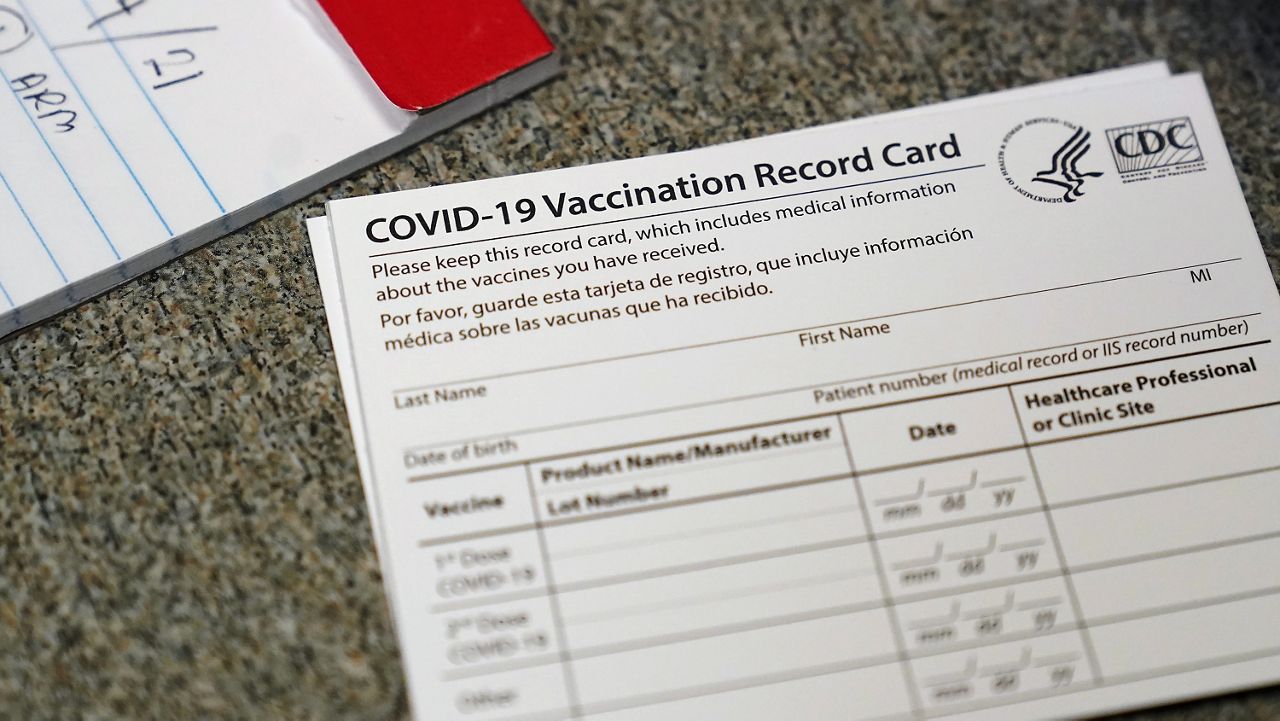If you've received a COVID-19 vaccination and want to share the good news on social media with your friends and loved ones, or use social media as a platform to encourage others to get the shot as well, you might want to leave your vaccination card out of the photo.
The Better Business Bureau issued a warning on Friday urging people not to upload photos of their vaccination cards to social media, saying it "makes you vulnerable to identity theft and can help scammers create phony versions."
"Unfortunately, your card has your full name and birthday on it, as well as information about where you got your vaccine," the BBB's warning reads. "If your social media privacy settings aren’t set high, you may be giving valuable information away for anyone to use."
Personal information isn't the only risk at play, according to the BBB: Scammers in the U.K. were caught making fake vaccination cards, and the agency warned that similar scams could reach the United States in short order.
The BBB recommends instead using a profile frame or sharing a selfie with your vaccination sticker, as well as reviewing personal privacy settings on social media.
The agency also warned of following other viral social media trends that could be used to mine for your personal information – such as listing your favorite songs or tv shows or cars you've owned – saying they can be used to guess your passwords or security questions for resetting said passwords.
This is far from the first scam related to the coronavirus vaccine.
In late December, the FBI, the U.S. Department of Health and Human Services Office of Inspector General, and the Centers for Medicare & Medicaid Services issued a warning to Americans about fraud schemes related to the ongoing coronavirus pandemic – and in particular, those related to the approved COVID-19 vaccines.
COVID-19 scams – vaccine-related or otherwise – are largely digital schemes aimed at committing identity theft and online fraud. Unfortunately, these schemes vary in style, scope, and intent, which makes parsing out fact from fiction all the more difficult.
“There's a lot of social media scams, advertisements, there's unsolicited emails, phone calls, robocalls, there's text messaging, door-to-door services where people are offering you the opportunity to get the vaccine sent to your home, to get home-tested, or to be put on a waiting list for the vaccine if you could pay a small fee,” Rania Mankarious, CEO of Crime Stoppers of Houston, told Spectrum News. “They're offering you to take part in surveys, or marketing campaigns, or test groups for the vaccine. And all of that is false, all of it is fake.”
Last week, the Better Business Bureau (BBB) warned of a common scam popping up across the country where victims are asked to share their insurance information via telephone or text message.
"I gave (the scammer) my Medicare number and confirmed my name and address," one victim reported to the BBB. "He said he was going to come out to my house to administer the (COVID-19) test, and then the vaccine but he never showed."
Regardless of where you are, there are some universal steps to take to protect yourself from vaccine-related scams.
Experts say the solicitation of money in exchange for a vaccine is one of the more common scams they see. In any state, this is an easy way to spot a scam: you cannot pay to put your name on a vaccination list, nor can you pay to get early access to the vaccine, according to the Federal Trade Commission.
Many experts also agree on one simple rule of thumb for detecting scams: If it seems too good to be true, it probably is.
Still, it’s important for consumers to be familiar with their local government’s vaccine distribution policy, which Mankarious says should be obtained from "reputable sources" in order to "mitigate false information" about the virus.
"The best defense is education," Mankarious said of spotting COVID vaccine scams. "We're all desperate to navigate and understand this virus, and we're all desperate to get back to life as normal. But don't contribute by sharing information you don't know is true."
"We're also calling on people to — before you go ahead and share information related to COVID — please make sure your source is a local government website, a state website, or a federal website,” she added.
Experts also urge Americans to report any COVID scams to their local FBI or BBB offices as soon as possible, regardless of whether the ruse was successful.
Spectrum News' Rachel Tillman contributed to this report.



